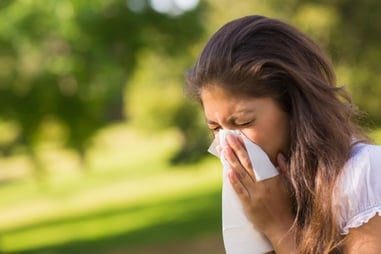 It's that time of year when many people suffer from runny noses, sore throats, congestion, sneezing, watery eyes, and coughing. As you try to manage your symptoms, you might find some relief, but many people are left feeling very confused about their health status.
It's that time of year when many people suffer from runny noses, sore throats, congestion, sneezing, watery eyes, and coughing. As you try to manage your symptoms, you might find some relief, but many people are left feeling very confused about their health status.
When you have the same symptoms for allergies as you do the common cold, how do you know which one it is? Both allergies and colds present in similar ways, but there are three key differences to note when trying to determine which one your body is battling.
1. Fever
Allergies wreak havoc on your day in a number of ways; fever is not one of them. A fever is your body’s natural defense to an invasion of infectious organisms, the very organisms responsible for the common cold. You see, these organisms need the perfect environment to survive and thrive. Their version of paradise is somewhere in the range of a nice and balmy 98.6 degrees.
When your body notices the organisms, it will send out its army of white blood cells and their antibodies to fight the invasion. If the organisms start winning the fight, your body decides to bring in the secret weapon: a fever. Your body’s temperature rises from that balmy 98.6, creating an environment too warm for the organisms to thrive in with hopes of killing them off.
If you’re experiencing a fever with your symptoms, you do not have allergies; you have a cold. If you are an adult (18+ years old) and your temperature is rising to 103 degrees it’s time to call your doctor or visit a health care clinic.
The same recommendation remains for a child (2 to 17 years old) with a fever approaching 102 degrees that is not responding to medication, and if your child ages 3 months up to 2 years has a fever approaching 102 degrees. If a child under the age of 3 months is running a fever of any type, please contact your healthcare provider immediately.
2. Body aches
Are you coughing, sneezing, constantly wiping your runny nose, and feel like you got hit by a train? That last one is a classic symptom of the common cold. If your body aches it’s completely normal (within the scope of illness) to feel this way, though it’s not any fun.
Sometimes a warm bath with Epsom salt can help ease the pain, as can anti-inflammatory medications like ibuprofen or acetaminophen. You may have some luck with an anti-histamine, as they are partly responsible for the aches (your system’s natural histamines make the pain receptors in your body get weird).
If all else fails, distract yourself with something you enjoy. Even if it’s binging on Netflix (we won’t judge you). When you partake in an activity you enjoy, your mind rewards itself with dopamine (a natural pain reliever). If you have a cold you need the rest anyway!
3. Recovery time
The common cold typically runs its course within 3 to 5 days. Allergies can last entire seasons, or all year long. If you’re 5 days into this icky feeling and haven’t experienced body aches or a fever, it’s very possible you have allergies.
If you've never had allergies in your life, it doesn’t matter. The unfortunate truth about allergies is your body’s ability to develop them at any time (you can also recover from allergies, but you still run the risk of them returning).
The good news is there are plenty of over the counter medications to help you combat this. You can choose between oral medications, nasal sprays, and even eye drops. There are also prescription medications available, though they will need to be obtained through a doctor.
If you want to take medications, there are other ways to cope and manage them the best you can:
- Get a good night's sleep.
- Try running a humidifier or diffusing essential oils while you sleep.
- Take a shower before bedtime to rinse allergens off your body.
- Drink plenty of fluids. (Water and vitamin C are your best options!)
- Run an air purifier.
- Consistently changing your air filters.
- Staying away from animals (if you have a pet dander allergy)
- Keep your windows closed.
- Take off your shoes and/or jacket when you get home.
While you can't completely steer clear of what may be causing your allergies, you can try to manage them and live life with them.
Contact your healthcare provider, or drop into one of Orchard Hospital's Medical Specialty Facilities – Your Everyday Health Care Clinic to meet with us. We may be able to help you determine if you have the flu or allergies, and discuss ways to help you heal or manage whichever one is affecting you.
We want what’s best for your health, because that is what’s best for our community. We will take care of you quickly and efficiently. Appointments are recommended, but walk-ins are welcome. Open 7 days a week. It’s our goal to have fast and friendly care while delivering quality health care.
Our mission at Orchard Hospital is to provide our community with superior health care. We strive to ensure that your experience at Orchard Hospital is as pleasant and comfortable as possible. Our priority is to provide you with the care you need when you need it, with skill, compassion, and respect.



